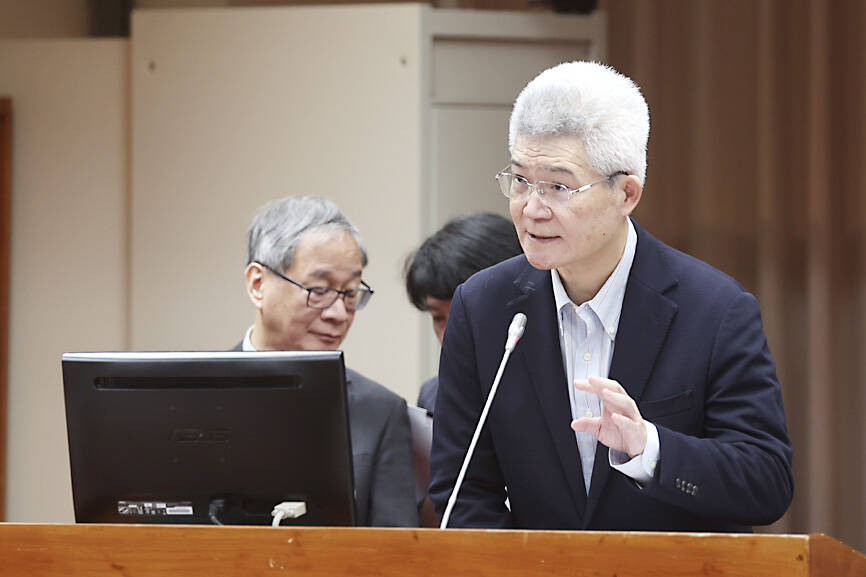Opposition lawmakers yesterday vowed to cut funding for the English-language TaiwanPlus television channel due to controversies over its news coverage, and demanded that the Ministry of Culture conduct a review.
Minister of Culture Li Yuan (李遠) and Public Television Service chairman Hu Yuan-hui (胡元輝) were questioned by Chinese Nationalist Party (KMT) and Taiwan People’s Party (TPP) legislators during a committee meeting on issues relating to the state-financed TaiwanPlus.
Operated by Public Television Service under the ministry’s jurisdiction, TaiwanPlus has been embroiled in several controversies recently.

Photo: CNA
KMT legislators requested that TaiwanPlus remove a news report on the US election describing US president-elect Donald Trump as a “convicted felon,” saying it was inappropriate and biased.
The channel took down the video, while Public Television Service said it would review its operational procedures.
TPP legislators have also criticized TaiwanPlus for using a photograph of TPP Chairman Ko Wen-je (柯文哲) in handcuffs during the segment “Taiwan Corruption Crackdown,” which they said was mainly about reports relating to investigations of Ko.
KMT Legislator Lo Chih-chiang (羅智強) yesterday accused TaiwanPlus of operating as a “state propaganda outlet” on behalf of the Democratic Progressive Party (DPP) government, “helping to whitewash news” and “direct media attention of international communities” in favor of the DPP.
“We shall scrutinize the budgets for Public Television Service and TaiwanPlus and cut their funding as we see fit,” Lo said.
KMT Legislator Hung Meng-kai (洪孟楷) said that TaiwanPlus has cost taxpayers NT$5.8 billion (US$178.21 million), “but the world only heard its biased reporting.”
He also alleged that the channel has low viewership, downloads and subscriptions abroad.
Li said that TaiwanPlus has an annual budget of about NT$800 million and has totaled NT$2.8 billion since its launch three years ago.
The overall budget of NT$5.8 billion included funding for making documentaries and other programs to improve its media services, he said.
“Currently, the results at TaiwanPlus are not yet ideal,” he said. “However, it can be strengthened.”
Li and Hu also defended the Trump report, saying that media in other countries also used “convicted felon” to describe him during the campaign.
DPP caucus chief executive Rosalia Wu (吳思瑤) said that Taiwan has fought hard to remove central government, military or political party control over media, “yet the KMT and TPP are now interfering in freedom of expression and media independence by seeking to repress news reports they object to.”

A Taiwanese software developer has created a generative artificial intelligence (AI) model to help people use AI without exposing sensitive data, project head Huang Chung-hsiao (黃崇校) said yesterday. Huang, a 55-year-old coder leading a US-based team, said that concerns over data privacy and security in popular generative AIs such as ChatGPT and DeepSeek motivated him to develop a personal AI assistant named “Mei.” One of the biggest security flaws with cloud-based algorithms is that users are required to hand over personal information to access the service, giving developers the opportunity to mine user data, he said. For this reason, many government agencies and

The National Fire Agency on Thursday said a series of drills simulating a magnitude 8.5 earthquake would be held in September to enhance the government’s emergency response capabilities. Since earthquakes cannot be predicted, only by continuously promoting disaster prevention measures could Taiwan enhance its resilience to earthquakes, agency Director-General Hsiao Huan-chang (蕭煥章) said in a news release. The exercises would be held to mark annual National Disaster Prevention Day on Sept. 21, the aim of which is to test Taiwan’s preparedness and improve its earthquake resilience in case of a major temblor, Hsiao said. As part of those drills, an earthquake alert would

DEFENSE: The National Security Bureau promised to expand communication and intelligence cooperation with global partners and enhance its strategic analytical skills China has not only increased military exercises and “gray zone” tactics against Taiwan this year, but also continues to recruit military personnel for espionage, the National Security Bureau (NSB) said yesterday in a report to the Legislative Yuan. The bureau submitted the report ahead of NSB Director-General Tsai Ming-yen’s (蔡明彥) appearance before the Foreign and National Defense Committee today. Last year, the Chinese People’s Liberation Army (PLA) conducted “Joint Sword-2024A and B” military exercises targeting Taiwan and carried out 40 combat readiness patrols, the bureau said. In addition, Chinese military aircraft entered Taiwan’s airspace 3,070 times last year, up about

STRICTER ENFORCEMENT: Taipei authorities warned against drunk cycling after a sharp rise in riding under the influence, urging greater public awareness of its illegality Taipei authorities have issued a public warning urging people not to ride bicycles after consuming alcohol, following a sharp rise in riding under the influence (DUI) cases involving bicycles. Five hundred and seven people were charged with DUI last year while riding YouBikes, personal bicycles, or other self-propelled two-wheelers — a fourfold increase from the previous year, data released by the Taipei Police Department’s Traffic Division showed. Of these, 33 cases were considered severe enough to be prosecuted under “offenses against public safety,” the data showed. Under the Road Traffic Management and Penalty Act (道路交通管理處罰條例), bicycles — including YouBikes and other